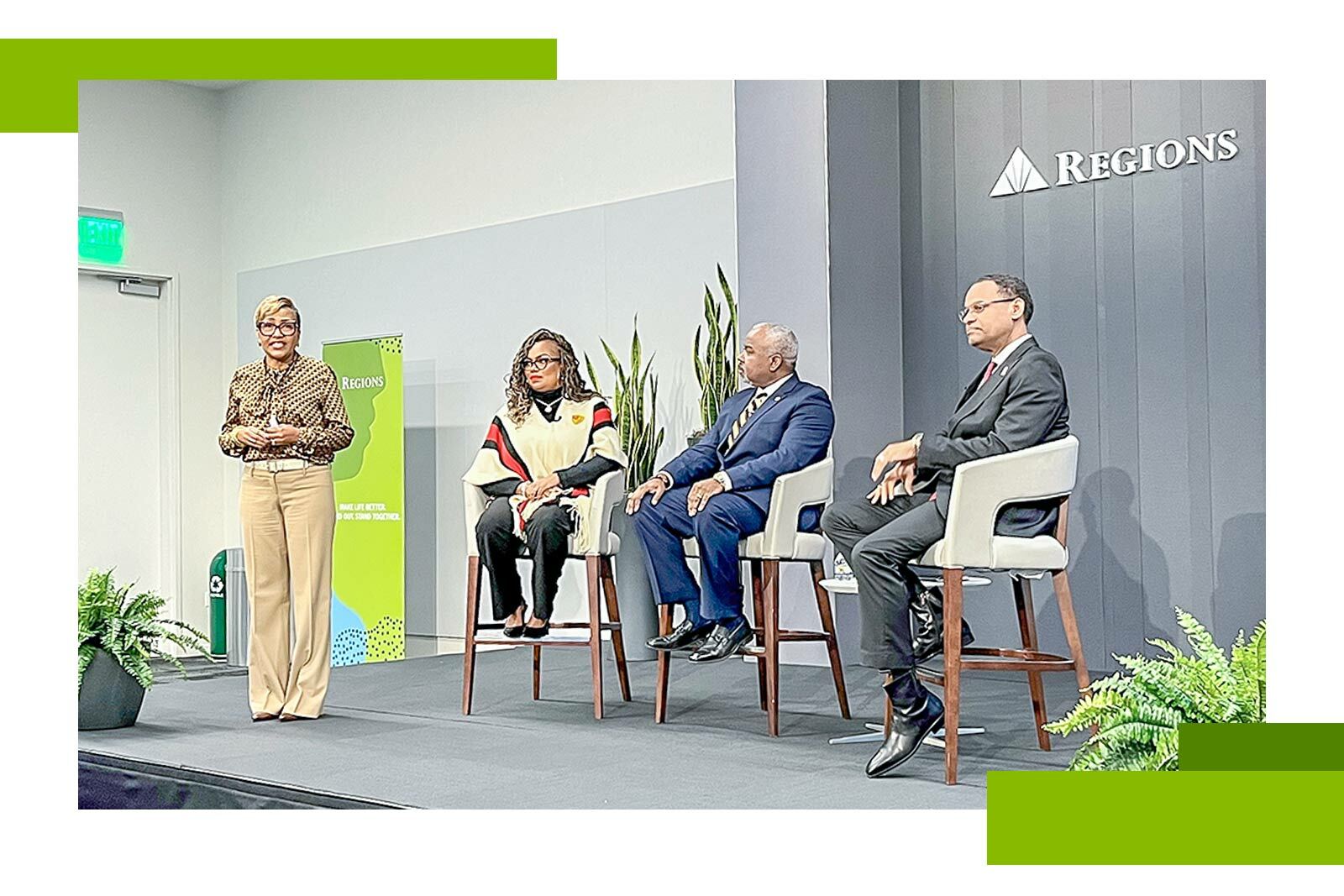Taleisha Ming White serves Regions Bank with a purpose as Social Impact & Diverse Talent Partnerships Manager and credits her college experience with setting her on the right path.
“‘My HBCU changed my life’ is a phrase you will often hear from HBCU graduates,” said Ming White, an alumna of Tuskegee University. “HBCU pride is more than a campaign or a hashtag. It is a lifestyle that’s deeply rooted in our rich history.”
Historically Black Colleges and Universities – or HBCUs for short – not only have a rich history, they have a bright future and play a key role in moving communities forward. Regions Bank celebrated Black History Month with a conversation featuring three HBCU presidents, convened by Regions’ Diversity, Equity and Inclusion team and moderated by Ming White.
During the hour-long conversation, Regions Bank associates attending in person and remotely heard from special guests Dr. Glenda Glover, president of Tennessee State University; Dr. Quinton T. Ross, president of Alabama State University; and Dr. Daniel K. Wims, president of Alabama A&M University.
Watch and listen as HBCU presidents share their excitement about the bright future of HBCUs – what’s new and what’s next.
Panelists discuss the history of HBCUs to promote better understanding. See more here.
What follows are highlights from the wide-ranging conversation.
The Path to the Presidency
All three HBCU presidents on the panel are also HBCU graduates. Panelists shared their experiences as HBCU students and their leadership journeys.
“Why I was so interested in becoming the president of Tennessee State University (is that) I saw it as an opportunity to serve an institution, a way to give back and to give back to the university that has given so much to me,” Glover said. “Leadership is no more than a privilege to serve. And I was able to give back. I’m able to give back to TSU so it’s a full circle moment for me. It’s been such an awesome blessing to come back [to TSU] and lead the very institution that gave me my start.”
The Importance of Partnerships
Regions has a long history of partnering with HBCUs. Panelists shared how they believe the business community and HBCUs can work together to make a lasting impact.
“When [the death of] George Floyd happened, I wrote a piece and it just simply said, ‘What Do I Tell My Sons?’’’ Ross recounted. “When you continue to look at the racial divide and the things that are happening in this country over and over again, it just seems to repeat itself. And so, I think it was an awakening for corporations to say that, you know, this has happened for far too long. We need to get off of the sideline and get in the game. And so, we’re thankful for the partnerships that come in. We have to make them mutually beneficial. The money is good, but your jobs are better. The internships are better. And that’s what we have turned these partnerships into.”
Investing for the Future
Panelists discussed the case for investing in HBCUs and the most pressing needs today.
“We are an investment. And we are an investment into the developing fiber and fabric of the larger nation,” Wims said. “That investment is not just to create access and opportunity, which is our mission as a land grant first and foremost, but it’s also to create a cadre of leaders, leaders that can serve in your companies and corporations, help you to grow and build.”
“The truth is, many of our students don’t have – not just access – but they don’t have the financial wherewithal to attend any institution and write a check for the tuition and fees. So, our number-one priority now is working to bridge that wealth gap and bridge the opportunity and access.”
Regions Bank is proud to partner with HBCUs in the communities we serve. Hear Clara Green, head of Diversity, Equity and Inclusion; and Taleisha Ming White, Social Impact & Diverse Talent Partnerships Manager, share more details and their vision for the future in this video.
Read more about how Regions Bank is collaborating with HBCUs.
Land Grants? 1890s? Tell Me More!
References to “1890s” and Land Grant Institutions came up a number of times during the HBCU conversation. This shorthand ties back to the history of HBCUs, when 19 historically black universities were established following the passage of the second Morrill Land-Grant Act of 1890. The Act specified that states using federal higher education funds must provide an education to Black students, either by opening the doors of their public universities or by establishing schools specifically to serve them. More details are available here.
 From left to right: Clara Green, Taleisha Ming White, and HBCU presidents Dr. Quinton T. Ross and Dr. Daniel K. Wims.
From left to right: Clara Green, Taleisha Ming White, and HBCU presidents Dr. Quinton T. Ross and Dr. Daniel K. Wims.